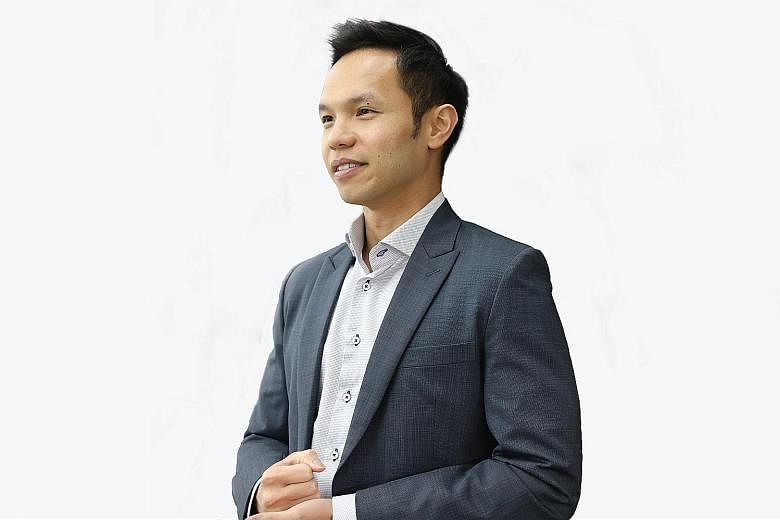Singapore could benefit from having a secondary, private exchange to allow investors to buy shares of non-listed companies.
This idea - a relatively new one here - is under scrutiny from financial industry players.
The aim is to give more small and medium-sized enterprises (SMEs) a venue to raise capital without the constraints of being listed, while investors will have access to a wider selection of companies.
A NEW VISION
Private investment platform Fundnel said helping to create this private exchange is part of its 2020 vision. Its co-founder Kelvin Lee told The Straits Times: "Say you believe in the future of drones - today, there is really no way for you to invest in the industry because the companies are all private; certainly none are listed here.
"If we can provide research reports, valuation analyses and growth forecasts on these companies or the sector they are in - which Fundnel is already doing for its deals - then there is no reason why investors cannot buy and trade private company shares on a secured platform like a stock exchange."
-
$71m
-
Total value of 15 deals which private investment platform Fundnel has completed so far this year.
Fundnel runs an investment platform that matches accredited investors and fund managers with growth-stage and pre-listing SMEs. Potential companies are screened by Fundnel's financial data analytics before being deemed suitable for investors.
The digital platform has completed 15 deals worth a combined US$49 million (S$71 million) so far this year, while building a network of 4,500 investors and corporates across South-east Asia.
"We have the technology, the platform, the data and the sell-side network to make this happen. Now we just need the support and collaboration of regulators, banks and, of course, the Singapore Exchange to create this ecosystem," said Mr Lee.
Fundnel and its partners are still exploring the exact format of this exchange, including its pricing and trading mechanisms. It could be conducted through private tender offers, but the exchange will hopefully be opened to casual investors, he added.
STRIKING A BALANCE
Private exchanges for trading non-listed shares have found audiences elsewhere. In the United States, the Nasdaq Private Market has been gaining traction, with its volume hitting US$544 million in the first half this year, up 136 per cent from a year earlier.
They have become more common since the global financial crisis, as rising compliance burdens and weak valuations push firms to seek capital beyond the option of getting listed. Mr Lee said: "The road to IPO (initial public offering) is often uncertain, requiring much time, effort and resources. Once listed, the public exchange will also demand more onerous disclosures and reporting results quarterly."
Mr Steven Fang, chief executive of investment platform CapBridge, also backs the idea, although he sees potential hurdles. CapBridge helps mid- to late-stage companies raise funds from institutional and accredited investors.
Said Mr Fang: "A private exchange will lead to more innovative and viable investable assets, as long as the right balance of free market forces and regulatory involvement is achieved.
"The upside of getting it work would be tremendous - the private exchange can become a global beacon that attracts good companies and talents to Singapore.
"However, a private exchange has certain challenges that will need to be addressed - namely information transparency, disclosure and lack of liquidity. One of the main issues is that supply usually far exceeds demand. Buyer interest will only become substantial when many of the protections of the public market are available."
VIABILITY
Fundnel's Mr Lee believes demand and liquidity will improve as the private exchange grows. He said: "This is driven by changing investing behaviour of high-net-worth individuals in the region, with substantially more willing to allocate money into private investments.
"The millennials are also showing increasing preference to invest not in stocks but directly in companies that they can relate to and understand. But more importantly, this will democratise financing and give more casual investors a chance to invest alongside the professionals, instead of waiting for IPOs and joining long queues at ATMs."
The SGX gave a neutral response to the idea. Its head of equity capital market for SMEs, Mr Mohamed Nasser Ismail, told The Straits Times: "We will continue to observe this space, and stand ready to respond to market needs and demand, as appropriate."
But the bourse is far from being inactive in this area. CapBridge is, in fact, an SGX partner in helping firms exit the private investment market to become publicly listed.
Said Mr Fang: "We see potential for a secondary private market where pre-IPO securities are anchored by key institutional investors... Potentially, if these pre-IPO securities are aggregated in an index fund, then accredited investors might also have the comfort to buy and sell through a private exchange."


